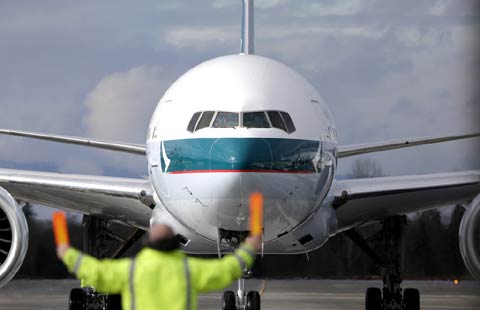Indicators may pose tough growth questions
(China Daily) Updated: 2015-04-15 09:28China's economic growth rate look to have slipped in the first quarter to the slowest pace since the global recession of 2009, if analysts have called it right.
The nation's gross domestic product report for the three months through March to be released on Wednesday in Beijing will show growth slowed to 7 percent from a year earlier, according to the median estimate of economists surveyed by Bloomberg.
For an under-the-hood look at how the world's second-largest economy is faring, keep an eye out for these nuts and bolts that are also scheduled for release on Wednesday:
1. Will industrial activity show a deeper slowdown?
Industrial production, released at the same time as GDP, is forecast to grow 7 percent in March from a year earlier. A weaker reading would raise questions over the durability of a recent stabilization in the official Purchasing Managers' Index.
Electricity output, watched by Premier Li Keqiang, has seen its power fading, rising just 1.9 percent from a year earlier in January and February combined.
2. What's the deal with exports?
China's exports surged in February and then slumped in March. What's going on? Wednesday's report may clear that up.
The nation's biggest exporters, accounting for about 85 percent of shipments, report the value of goods delivered in a figure that is typically less volatile and clear of the effects of fake invoicing or the crackdown on that practice. It can be found in the same statement as industrial production.
3. Will the GDP deflator fall below zero?
Central bank Governor Zhou Xiaochuan said last month the country needs to be vigilant about deflation risks. He will no doubt be among the many who crack out their calculators to crunch the gap between nominal GDP (unadjusted for inflation) and real GDP (adjusted for price changes) which gives the indicator of economy-wide inflation. The GDP deflator might fall below zero for the first time since 2009, said analysts at China International Capital Corp.
"In China, when CPI falls below 1 percent it is virtually deflation, because enterprises will have no initiative to make investment and expand capacity," Chen Xingdong, chief China economist at BNP Paribas SA in Beijing, said last week after a report showed the CPI rose 1.4 percent in March from a year earlier.
- China plays crucial role in advancing South-South cooperation
- Asian business aviation show opens in Shanghai
- China's fixed asset investment up 13.5%
- Beijing's high-end residential sector faces downward pressure in 2015
- China's property investment up 8.5% in Q1
- Singapore businesses to benefit from the 'Belt and Road'
- China Q1 retail sales up 10.6%
- China's Q1 industrial output up 6.4%

















